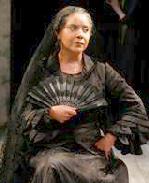SEARCH
REVIEWS
FEATURES
NEWS
Etcetera and
Short Term Listings
LISTINGS
Broadway
Off-Broadway
NYC Restaurants
BOOKS and CDs
OTHER PLACES
Berkshires
London
California
DC
Philadelphia
Elsewhere
QUOTES
On TKTS
PLAYWRIGHTS' ALBUMS
LETTERS TO EDITOR
FILM
LINKS
MISCELLANEOUS
Free Updates
Masthead
Writing for Us
A CurtainUp Review
Bernarda Alba
| Not a breath of outside air is going to enter this house. Not for as long as we're in mourning. --- The tyrannical matriarch Bernarda Alba, sentencing her five unmarried daughters to mourn their father for eight years in keeping with the church and community's strict rules/ |

Phylicia Rashad
(Photo: Paul Kolnick) |
While Bernarda Alba certainly fits LaChiusa's penchant for dour source material more often associated with opera than musical theater, it has more dialogue than his frequently sung-through pieces. Phylicia Rashad, who has greatly enriched the stage since leaving her famous and quite different maternal role on the Cosby show, is a somewhat strange choice for the title character. She has the presence to embody the dictatorial head of this strictly conventional and religious household of women. However, despite the composer's having given her relatively undemanding songs, her voice lacks the power of the rest of this cast, or other LaChiusian interpreters like Audra MacDonald and Mary Testa. Rashad is at her best in the interchanges with Poncia (the excellen Candy Buckley), her long-time maid and confidante who is never allowed to forget that she is a servant and why Bernarda insists that her daughter marry men suitable to their superior social position.
Graciela Daniele's direction and choreography bring out the vivid flamenco rhythm that flavors the score. The daughters' solo arias beautifully express their individual personalities. Despite it requiring a stretch to accept the pretty Daphne Rubin-Vega as the family ugly duckling, her voice and poignant acting stand out.
Christopher Barreca's bare stage, somberly lit by Stephen Strawbridge -- a wooden floor with the only props a back wall with a door to suggest the sealed in convent-like atmosphere and a set of multi-functional ladderback chairs -- certainly can't be accused of being too sunny and sumptuous, as was last year's London production of the play (see link below). Tony-Leslie James' funereal black costumes are also in keeping with the story. Nevertheless, when when translating a play like this into a musical format something often has to give and in this case it's the political allegory. Unless you are intimately acquainted with the play and its background, you'll get only the vaguest sense that Adela's death, caused by the denial of her youthful passion, mirrors Lorca's own tragic end during Franco's regime.
Still, the show's stark look and feel are quite stunning. The excellent nine-piece orchestra is astutely perched above the back wall and the lyrics and libretto make the tensions in this repressed household easy to follow. The ever-present affect of men on this female world is made amply clear via the never seen Pedro who courts Augustias (Saundra Santiago), the oldest daughter from a first marriage for her dowry, while making love to Adela (Nikki M. James), the youngest and fanning the desire of hunchbackedMartiro (Rubin-Vega).
The strengths of the music and performances, notwithstanding, and high spots (the brief mad Miss Haversham appearances of Bernarda's own mother Maria Josepha (Yolande Bavan) and the scene in which two maids imitate the pounding hoofs of a pair of horses mating outside the house in counterpoint to the sexless, claustrophic life within), audiences are likely to be split between those who will love its art-y gloominess and those (this critic among them) for whom it's less exhilarating than such LaChiusa works as See What I Want to See, The First Lady Suite and his first Lincoln Center success the wonderful Hello Again.
Lorca didn't live to see this last of his trilogy known as his "rural tragedies" (Blood Wedding. Yerma). One can't help wondering what he would make of this latest version of his political allegory in which the nunnery-like House of Bernarda Alba is filled with frenzied flamenco footwork and singing nuns.
LINKS TO REVIEWS OF NON-MUSICAL VERSIONS OF THE LORCAS PLAY
London Production
Los Angeles Production
NAATCO production
Prospect Theater Production
Midaglia Cruz Adaptation
| Bernarda Alba Words and music by Michael John LaChiusa, based on the play The House of Bernarda Alba by Federico García Lorca Directed and choreographed by Graciela Daniele Cast: Phylicia Rashad (Bernarda Alba), Saundra Santiago (Angustias), Judith Blazer (Magdalena), Sally Murphy (Amelia), Daphne Rubin-Vega (Martirio), Nikki M. James (Adela), Yolande Bavan (Maria Josepha), Candy Buckley (Poncia), Laura Shoop (Young Maid), Nancy Ticotin (Servant and Prudencia). Set Design: Christopher Barreca Costume Design: Toni-Leslie Jame Lighting Design: Stephen Strawbridge Sound Design: Scott Stauffer Orchestrations: Michael Starobin Music Direction: Deborah Abramson Running time: 90 minutes without an intermission Mitzi Newhouse Theater at Lincoln Center, 212-239-6200 From 2/11/06 to 4/09/06; opening 3/06/06. Tuesday to Saturday @ 8pm, Wednesday & Saturday @ 2pm, Sunday @ 3pm Tickets: $75 Reviewed by Elyse Sommer based on March 8th performance |
|
Musical Numbers
| |
Act One
|
|
The Internet Theatre Bookshop "Virtually Every Play in the World" --even out of print plays

Easy-on-the budget super gift for yourself and your musical loving friends. Tons of gorgeous pictures.

6, 500 Comparative Phrases including 800 Shakespearean Metaphors by our editor.
Click image to buy.
Go here for details and larger image.








